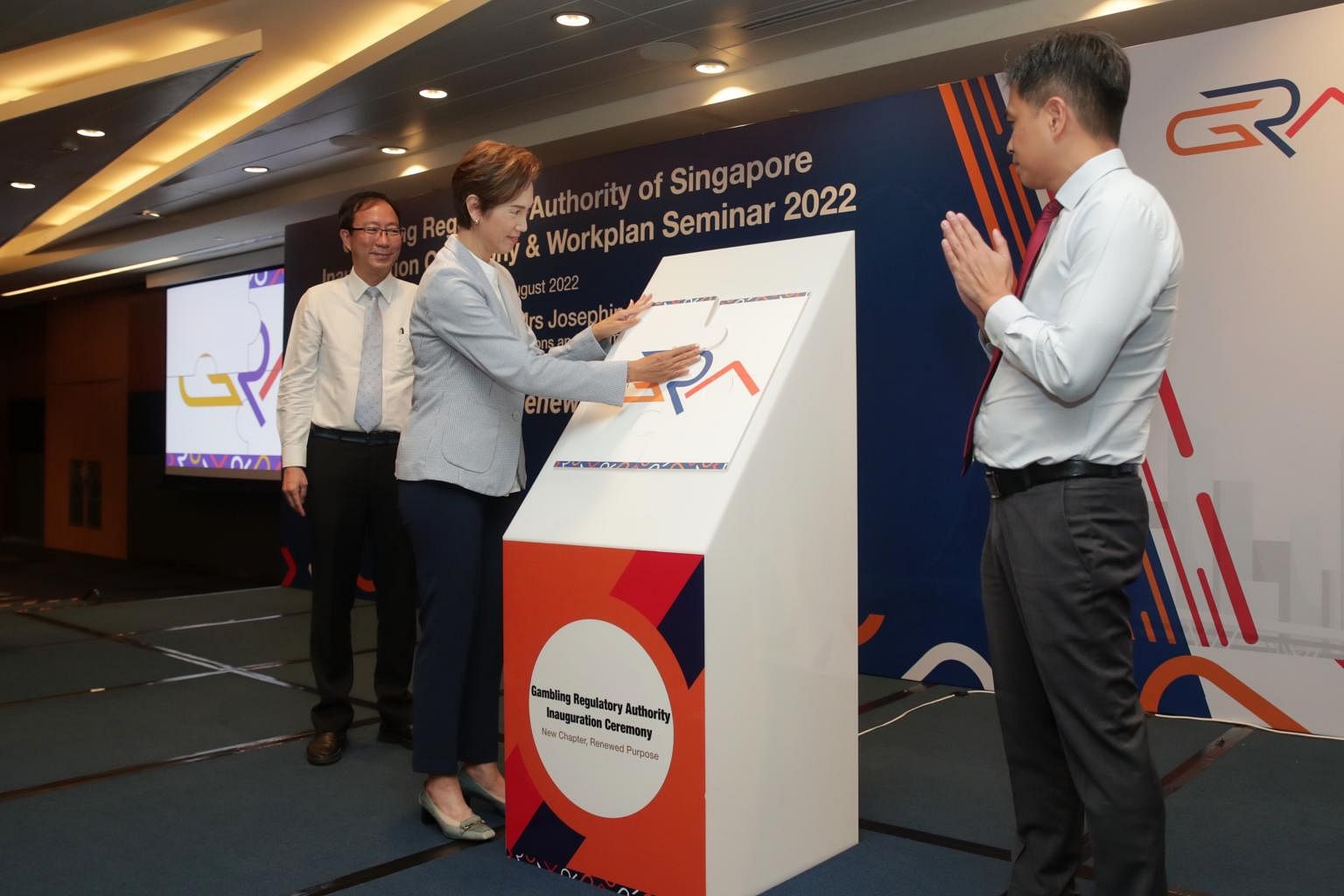Gambling Regulatory Authority inaugurated in S'pore as new products emerge
Sign up now: Get ST's newsletters delivered to your inbox

The authority will regulate a sweeping range of gambling services, including loot boxes in online video games.
PHOTO: LIANHE ZAOBAO
Follow topic:
SINGAPORE - A central body that aims to stay ahead of new and global trends, and respond more adequately to emerging gambling products, was inaugurated on Tuesday (Aug 16).
The Gambling Regulatory Authority (GRA) will regulate a sweeping range of gambling services, including those offered in casinos and lotteries, as well as sports betting and loot boxes in online video games.
This comes amid shifting trends and a blurring of the line between gambling and gaming.
The GRA takes over from the Casino Regulatory Authority, which was established in 2008 to oversee Singapore's two integrated resorts - Marina Bay Sands and Resorts World Sentosa.
At the inauguration ceremony at Suntec Singapore Convention and Exhibition Centre on Tuesday, Mrs Josephine Teo, Second Minister for Home Affairs, said the formation of the GRA is an important next step for gambling regulation in Singapore given how the landscape will be very different in five years.
Mrs Teo, who is also Minister for Communications and Information, noted how technology developments have made it easier for people to gamble any time and anywhere, widening the scale and scope of online gambling.
Shifting consumer preferences have also given rise to new gambling products and the boundaries between gambling and gaming have blurred, she said.
Mrs Teo said: "There are more and more variants of gaming, gambling and games of chance, such as those involving cryptocurrencies or using crypto technology."
When asked about upcoming initiatives, a GRA spokesman said that a $100 prize cap on mystery boxes, previously proposed by the Ministry of Home Affairs (MHA), may come into effect as early as next year.
The spokesman added: "The cap will prevent the inducement effect of high-value items and the normalisation of gambling among youth."
In the coming months, the authority will also focus on streamlining its processes for approving licences, as the number of licences it issues is expected to increase significantly.
This comes as under the Gambling Control Act, which took effect this month, private establishments will have to get a licence to organise player-to-player games such as mahjong.
In her speech on Tuesday, Mrs Teo also mentioned that the Casino Control Act will be reviewed to enhance the casino regulatory regime. MHA said more details will be shared when ready.

Counsellors and gaming experts said the move to strengthen regulation will address the higher risks posed by online gambling and ensure social safeguards are in place.
Ms Tham Yuen Han, executive director of We Care Community Services, a charity that treats gambling addiction, said: "The accessibility and convenience of online gambling worsens the risk of addictions progressing, as these platforms operate 24/7.
"Some of our clients have spent tens of thousands (of dollars) on such platforms and these financial consequences can take a toll on families, especially when gamblers turn to illegal moneylenders to fuel their addiction."
Mr Lai Tuck Weng, founder of marketing consultancy Edge Digital, which specialises in gaming and technology, hopes that as online games of chance with gambling elements now fall under the GRA's regulation, there will be greater transparency in how such platforms operate.
He said: "While the probabilities of winning in card games, such as blackjack, are known, for online games of chance it is different, as these games may track the player's history and risk tolerance and directly manipulate game outcomes."
Parents The Straits Times spoke to said they were glad that loot boxes within video games would be regulated by the GRA.
Loot boxes are virtual goodie bags gamers buy with real cash that provide random rewards. But the chance of obtaining these rewards can be as low as 0.00005 per cent.
Mr Lai added that while loot boxes may cost only a few dollars individually, gamers have spent thousands of dollars to buy these boxes to upgrade their characters.
Ms Junia Tan, 44, who has five children aged five to 16, said: "Even though these are just games, children may not fully understand the opportunity cost of the money they are spending."
The parenting coach added: "This legislation sends a signal to kids to recognise that gaming platforms can be fun, but also pose dangers."

